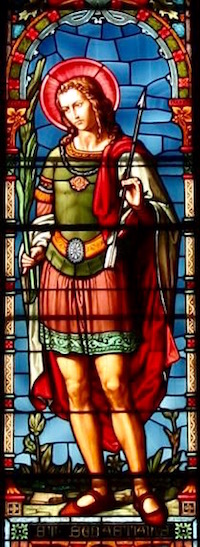
Some have recently stated that early Christians were pacifists and would not engage in the Roman army, were loath to participate in the Roman army. They are wrong. The Catacomb of St. Sebastian on the Via Appia is named after a famous Christian martyr of the 3rd century—Sebastian. Sebastian was born in Narbonne, France in c. 256 to Italian parents and raised in Milan. We do not know when he became a Christian. His biographies, written a hundred years after his martyrdom, open with Sebastian as a soldier in the Roman army:
“…his natural inclination gave him an aversion to military life, but to be better able, without suspicion, to assist the confessors and martyrs in their suffering, he went to Rome and entered the army under Emperor Carinus about the year 283.” Acts Of St. Sebastian (c. 400)
Even though Sebastian did not have a “natural inclination,” (not a religious conviction) to be a soldier, he felt God called him to join the military to be able to minister to those soldiers who were undergoing persecution for their faith. The Roman military was a fruitful mission field for the Christian message. A Christian soldier did not, however, have divided loyalties between church and state. An inscription in the Catacomb of St. Callixtus memorializes a Christian soldier:
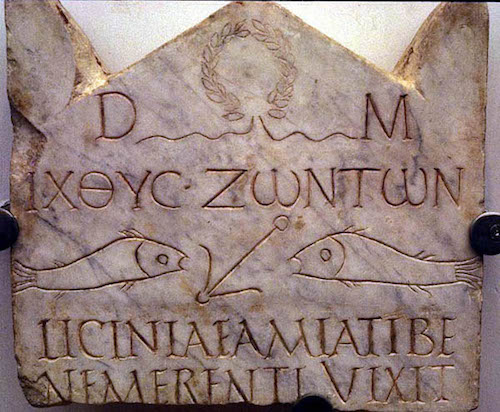
“His friends’ memories keep the record of Theodulus who died with military honors. His loyalty was outstanding among non-commissioned officers. He was faithful to all fellow-soldiers and friends. His reputation declares him a servant of God rather than of money and an upright official of the city prefecture. If I were able, I would sing his praise forever so that he may be granted the promised gifts of light.”
The Christian man Theodulus’ loyalty as a soldier was to Rome and to his “fellow-soldiers.” He was known as a “servant of God rather than of money (Mammon)” and was buried with “military honors.”
Apparently Roman Christian soldiers in some remote outposts were allowed to worship freely. A Christian church inside a Roman army fortress in Megiddo, Israel was discovered in the 1990’s.
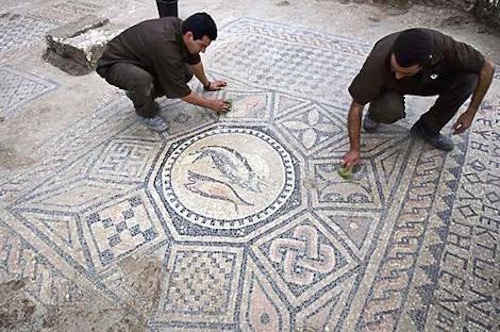
The small church was created from a back room in the fortress by Christian soldiers stationed there. The fortress served as the military headquarters of the Legio II Traiana (“Trajan’s legion”) and Legio VI Ferrata (“Ironclad Legion”). A mosaic on the floor shows two large fish, the Ichthus symbol.
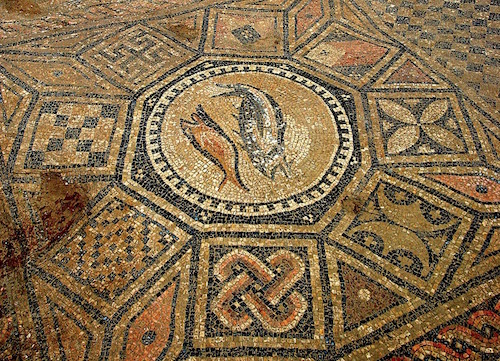
CLICK FOR ARTICLE ON ICHTHUS SYMBOL
In case some may interpret this as a common symbol and not a Christian symbol, two inscriptions written in Greek are on the mosaic:
“The God-loving Akeptous has offered the table to God Jesus Christ as a memorial.”
“Gaianus, also called Porphyrius, a centurion (leader of 100 men in the Roman army), our brother, has made the pavement at his own expense as an act of liberality. Brutius carried out the work.”
A Christian soldier named Akeptous donated an altar to the room. Another Christian soldier named Gaianus who had risen in rank to become a centurion paid for the mosaic to be done by another soldier named Brutius.
Lest any believe that the Roman army was not filled with Christian men, the following is an account written by the Roman Emperor Marcus Aurelius of a time in 174 when he was stranded in Germany without his legions and surrounded by German fighters:
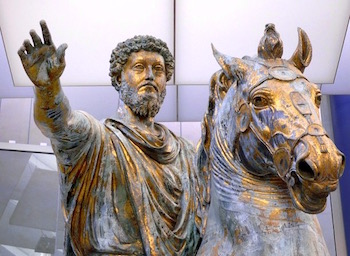
“….But being disregarded by them (his pagan gods to whom he had prayed), I summoned those who among us go by the name of Christians. And having made inquiry (in his army), I discovered a great number and vast host of (Christians) and I raged against them, which was by no means becoming; for afterwards I learned their power. Wherefore they began the battle, not by preparing weapons, nor arms, nor bugles; for such preparation is hateful to them, on account of the God they bear about in their conscience. Therefore it is probable that those whom we suppose to be atheists have God as their ruling power entrenched in their conscience. For having cast themselves on the ground, they prayed not only for me, but also for the whole army as it stood, that they might be delivered from the present thirst and famine. For during five days we had got no water, because there was none; for we were in the heart of Germany, and in the enemy’s territory. And simultaneously with their casting themselves on the ground and praying to God—a God of whom I am ignorant—water poured from heaven upon us refreshingly cool, but upon the enemies of Rome a withering hail. And immediately we recognized the presence of God following on the prayer—a God unconquerable and indestructible.” from Marcus Aurelius’ Epistle to the Roman Senate
Marcus Aurelius even had this incident portrayed on his victory Column, today still standing in the Piazza Colonna in Rome.
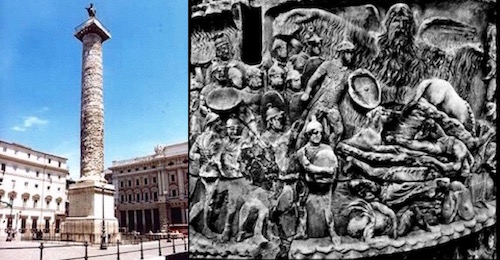
CLICK FOR ARTICLE ON THE MIRACULOUS RAIN EVENT
Clearly those who argue for the “pacifism” of early Christian men have not studied the subject well.—Sandra Sweeny Silver
